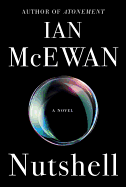
The clues are all there. The lovers are Trudy (Gertrude) and Claude (Claudius). Claude is the younger brother of John, Trudy's husband. Our narrator, the fetus upside-down in Trudy's womb, tells us that he is soon "to be," as opposed to "or not to be." Claude and Trudy talk of poisoning John, the narrator's father, albeit with antifreeze whipped into a fruit smoothie rather than with the juice of cursed hebenon. Once John's dead, they plan to sell the London home he inherited from his father and ditch the baby. For good measure, the novel mentions mortal coils and protesting too much, and includes such Shakespearean-sounding lines as, "But shush! The conspirators are talking."
Even readers who missed the epigraph will quickly figure out that Nutshell, Ian McEwan's (Atonement, The Children Act) ingenious novel, is a variation on Hamlet. The narrator is no ordinary unborn baby: his mother drinks so much wine that he can taste the difference between Sancerre and a grand cru. From the recorded lectures Trudy listens to, he knows about the ills of the world--the rise of "self-loving nationalism" and countries that torture their enemies, can't feed and clothe their children. And his mother and her lover are teaching him about murder and betrayal. This canny novel underscores facts that are as true today as they were in Shakespeare's time: everyone has to face his share of injustice, yet, if we are to believe Hamlet, each dog will have his day. --Michael Magras, freelance book reviewer

